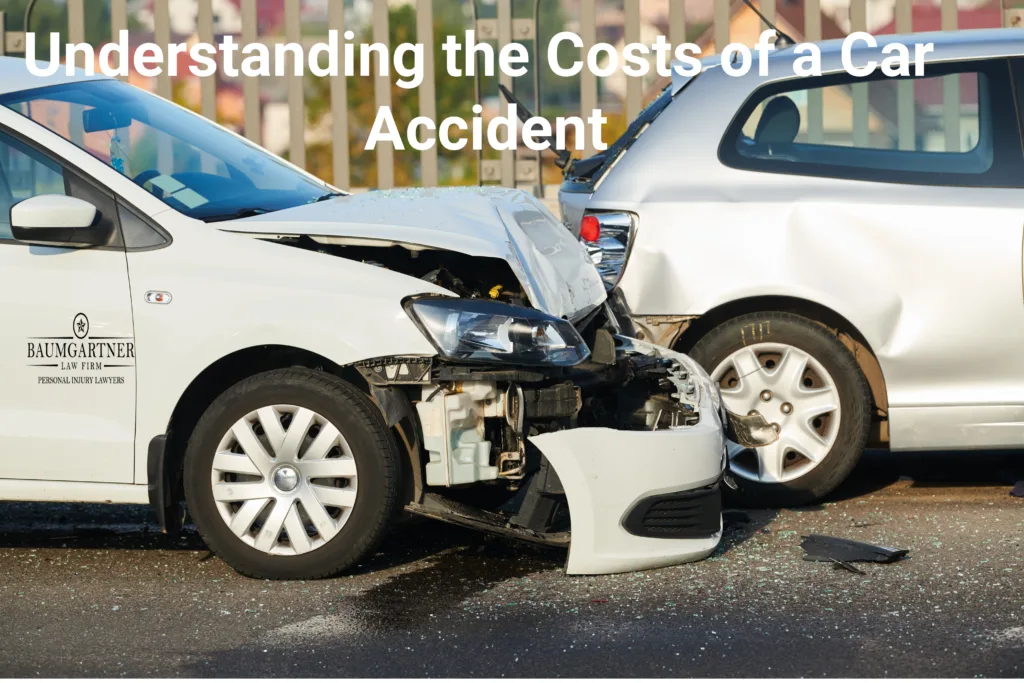Understanding the Costs of a Car Accident - A Guide

Navigating the aftermath of a car accident can be tough, especially when it comes to understanding the financial impact it can have on your life. This guide thoroughly examines the various costs associated with car accidents, from immediate expenses to long-term financial considerations. We aim to arm you with the knowledge to manage these costs effectively and minimize their impact on your financial well-being.
According to the NHTSA, traffic accidents cost America over 340 billion annually.
Table of contents
Immediate Costs Post-Accident
Medical Expenses
One of the primary costs incurred following a car accident is medical expenses. These can range from emergency room visits and hospital stays to follow-up appointments and physical therapy sessions. It’s crucial to consider both present and future medical costs, as some injuries may require ongoing treatment. One insurance company estimates the cost of a typical ER visit at $2,200 alone in 2024.
Injuries from bad impacts, like getting hit by a big rig, are often serious and cost tens of thousands of dollars for medical care.
Vehicle Repairs or Replacement
The damage to your vehicle can vary significantly, leading to costs ranging from minor repairs to total car replacement. A comprehensive assessment from a trusted mechanic is essential to understanding the full scope of repair costs.
Rental Car Fees
While your vehicle is being repaired, you may need to rent a car to maintain your daily routine. Rental car fees can accumulate quickly, adding a financial burden during this stressful time. Rental car fees are only part of the out-of-pocket expenses you can face after an accident.
Long-Term Financial Implications
Increased Insurance Premiums
Following an accident, it’s common for insurance premiums to increase, reflecting the heightened risk associated with your driving record. This long-term cost can significantly affect your monthly budget.
Legal Fees
If the accident leads to legal proceedings, whether you’re defending yourself or seeking compensation, legal fees can become a substantial financial burden. These car accident costs include attorney fees, court fees, and expenses related to gathering evidence.
Loss of Income
Accidents often result in time away from work, whether due to physical injuries or the need to attend medical and legal appointments. This loss of income can drastically impact your short-term financial stability. Lost wages are one of many economic damages.
Long-Term Medical Care
Some catastrophic injuries require long-term care, including surgeries, rehabilitation, and therapy. These ongoing medical costs can be one of the most significant financial impacts of a car accident. Often, brain injuries or back injuries can carry long-term medical needs.
Minimizing the Financial Impact of a Car Accident
Auto Insurance Coverage
Understanding your insurance coverage is crucial in minimizing out-of-pocket expenses. Ensure you’re adequately covered for liability and collision to protect against unforeseen costs. PIP, Medical Pay, and Uninsured Motorist coverage can all help after a car wreck.
Legal Representation
Seeking legal advice can help you with the complexities of injury insurance claims and legal proceedings, ensuring you receive reasonable compensation for your losses.
Financial Planning
Creating a financial plan to manage a car accident’s immediate and long-term costs can help mitigate its impact on your financial health.
In conclusion, understanding the comprehensive costs of car accidents is crucial for effective financial management. By preparing for both immediate and long-term expenses, individuals can navigate the aftermath of an accident with greater confidence and avoid common mistakes. This guide is a foundational resource to help mitigate the financial impact of car accidents, ensuring you are equipped to handle the challenges that may arise.
Related Resources:
- How Much Compensation Can I Get After a Car Accident in Texas?
- When Should You Hire a Car Accident Attorney in Houston? A Complete Guide
Baumgartner Law Firm Practice Pages:
About Our Law Firm
Baumgartner Law Firm is a Houston personal injury law firm headed by Greg Baumgartner.
Our firm was established in 1985 and has helped thousands of injury victims get maximum compensation for their cases. If you have been injured in an accident in Houston, TX, contact us for a free, no-obligation consultation. (281) 587-1111.
Helping these areas around Houston
Houston, Sugar Land, Conroe, The Woodlands, Cypress, Spring, Humble, Katy, Atascocita, Kingwood, and Tomball.
For a FREE Consultation Contact Us Today
"*" indicates required fields
Related Links
Our Experienced Houston Personal Injury Lawyer Can Help!
Case Results
$5,750,000.00 Truck Accident - Wrongful Death
$6,000,000.00 Daycare Injury
Confidential Settlement Commercial Vehicle Crash - Wrongful Death
Confidential Settlement Burn Injury
Confidential Settlement 18-Wheeler Accident - Wrongful Death
Legal Services
Contact the Auto Accident Lawyer
at Baumgartner Law Firm for Help!
Contact the Houston car crash law firm for help with a personal injury claim.
OR
Fill out an online consultation request for a FREE consultation.
Related Resources
- Texas Personal Injury Lawyer Near You
- Who Gets the Money in A Wrongful Death Lawsuit In Texas?
- Motorcycle Accident Lawsuit Settlement Factors
- How Do Personal Injury Attorneys in Texas Get Paid
- Contingency Fees in Houston Personal Injury Cases
About Our Law Firm in Houston
Houston personal injury lawyer Greg Baumgartner heads the Baumgartner Law Firm.
Our firm was established in 1985 and has helped thousands of injury victims get maximum compensation for their cases. If you have been injured in an accident in Houston, TX, contact us for a free, no-obligation consultation. (281) 587-1111.
Since 1985, Baumgartner Law Firm has limited our law practice to serious personal injury cases. Our legal team has won maximum compensation for thousands of accident victims and recovered millions of dollars for real people like you.
Helping these areas around Houston
"*" indicates required fields

